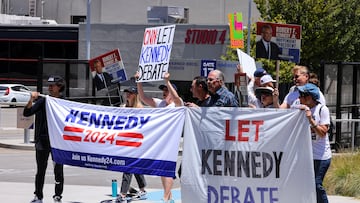Why didn’t Robert F. Kennedy Jr. qualify for the debate?
Robert F. Kennedy will not be present at Thursday’s presidential debate hosted by CNN. Here’s why he didn’t make the cut.


On Thursday, CNN will host a debate between President Biden and former President Donald Trump. The upcoming event is the first for the two candidates this election cycle. Though debates are typical, this one is happening relatively early. It’s uncommon for a party to feel confident enough in their nominee to allow for a formal debate before they have been officially nominated at the party’s convention. This year, the conventions will take place in July and August.
Nevertheless, both campaigns are eager to get the 2020 rematch underway, and now that most of the primaries are over, they see it as an ideal moment to begin throwing punches. For those lucky enough not to remember the debates between the two men in 2020, you should prepare for the mess we could witness later this week. The 2020 debates were unstructured, and the candidates made them unproductive by spending most of the time talking over one another and launching personal attacks. If debates form part of the democratic process to help voters make an informed choice on the policy positions and vision of the candidates, those debates failed categorically.
Read more from AS USA:
We can all hope that they will be better this time around...
Will any third-party candidates participate in the debate?
Some voters, upset with the two choices for the Democrats’ and Republicans’ tickets, have endorsed Robert F. Kennedy’s third-party candidacy. Kennedy has an outsider appeal but has been known to launder racist conspiracy theories, some of which revolve around the COVID-19 virus and pandemic. For those interested in learning more about the independent candidate, Thursday’s debate will not provide that opportunity.
Related stories
CNN, the organization hosting the debate, set strict participation requirements that the Kennedy campaign did not meet. And the campaign was not quite about their disapproval, as the event would have been a great opportunity for Kennedy to talk directly to millions of voters.
They tried to take away your independent choice for president and I'm not going to let them.
— Robert F. Kennedy Jr (@RobertKennedyJr) June 25, 2024
Watch the presidential debate as it is supposed to be and decide for yourself.
Streaming right here on X and https://t.co/cNn8VVwFIl pic.twitter.com/kYD1eMeLqH
To participate, the news network required that the candidates would appear on the ballot in enough states to receive 270 electoral votes and be polling at a minimum of fifteen percent in four national polls; the polls included in that count had to be approved by CNN. Nationally, Kennedy is polling at around seven percent. While this is a rather low number and an indication that his chances of being elected at this stage in the race are unlikely, those votes could sway the election one way or the other. It remains unclear which party voters will be pulled from, and in a close election, those votes could be needed to win those much sought-after electoral votes.
Complete your personal details to comment